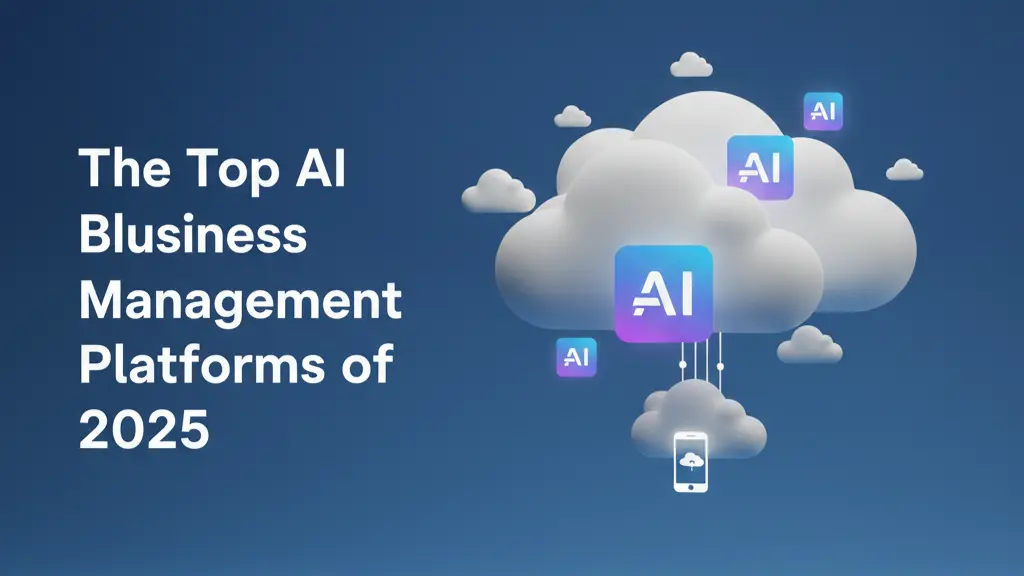Table of Contents
Toggle
Companies are starved for ideas yet drowning in data in the fast-paced modern digital economy. The response is AI cloud business management platforms. For businesses of any size, these linked suites are a major competitive advantage instead of a luxury for the Fortune 500. But what are they precisely, and how do you pick the greatest one?
This exhaustive manual will appeal to those who are perplexed by these powerful technologies, want to know the leading candidates in 2025, and need a clear road map for using their AI talents. Change your strategy based on your consumers and increase your profitability.
What is an AI Cloud Business Management Platform?
Hosted in the cloud, an AI Cloud Business Management platform is essentially a collection of business applications—including CRM, ERP, finance, HR, and supply chain—and AI and Machine Learning pervade it. Think of it as your company’s central nervous system, yet one that can learn, predict, and automate.
How is AI used for business in cloud computing? By continually evaluating your data to find patterns, forecast future occurrences, and automate complex tasks, these solutions go over and beyond basic data storage. What an AI business platform does is convert your previous data, from forecasting sales and tailoring marketing campaigns to automating financial statements and inventory optimization. What an AI business platform does is turn your historical data into a strategic asset for future growth.
Why Your Business Needs an AI-Powered Platform in 2025
To navigate a modern city with a paper map in 2025 is to stay with obsolete systems or fragmented software. AI tools produce real-time GPS for your business trip. For these factors, changing is not optional anymore.

From Data to Decisions: The Power of AI-Driven Analytics
Data-driven belief is replacing gut instinct. The benefits of predictive analytics these systems may assess vast volumes of data to predict sales, identify market trends, and stress potential hazards before they become problems. This changes your team from reactive fighting to strategic planning. Built into these systems, Business intelligence tools include dashboards that not only reflect past occurrences but also imply causes of events and future possibilities.
Automating for Efficiency: Streamlining Repetitive Tasks
Gut emotions are being supplanted with certainty drawn from statistics. AI can help with which company activities? These programs search vast amounts of data to forecast sales, spot consumer trends, and draw attention to possible hazards before they turn into problems. This converts your team from responsive firefighting to proactive planning. Built-in business intelligence tools on these platforms offer dashboards reflecting not only past events but also likely future situations and suggested causes for them.
Enhancing Customer Experience with AI Insights
In the consumer era, personalization rules supreme. Chatbots powered by AI for customer service may immediately solve problems, examine support calls for sentiment, and direct consumers to the appropriate agent. Beyond only assistance, it helps to create a customized customer journey by suggesting items, adapting marketing communications, and spotting at-risk accounts using customer churn prediction so you may actively intervene. AI creates long-term loyalty and increases client satisfaction in this way.
Key Features to Look for in an AI Business Management Platform
Given all the options, selecting an artificial intelligence business tool is quite important. Your assessment should go beyond just basic features. Here are the must-have AI platform characteristics and assessment criteria for management software:
- Native AI and Machine Learning: The AI shouldn’t be a bolt-on afterthought. Search for sites where AI forms the fundamental element of every application.
- Predictive and Generative Capabilities: It should provide both generative AI (content creation, code writing, report generation) and predictive analytics (numerical projections).
- Robust Automation Engine: The platform has to let you create and personalize workflows throughout divisions without constant developer assistance.
- Unified Data Model: One source of truth in a unified data model is not negotiable. Data stored in silos produces false AI insights.
- Scalability and Security: With you, the platform has to scale; it should have enterprise-level security, compliance certificates, and transparent data governance.
- User-Friendly Interface: User-Friendly Interface: If your staff find the AI tools too difficult to use, they will be abandoned.
The Top AI Cloud Business Management Platforms of 2025
Let’s now go over the top SaaS solutions using AI that are now molding the market. From corporate behemoths to agile solutions for expanding companies, this list spans all levels.

Salesforce Einstein (CRM-Focused Powerhouse)
Leading CRM provider Salesforce has incorporated its Salesforce Einstein AI capabilities throughout its platform. In Salesforce, AI automates predictive lead scoring, forecasts chances with amazing accuracy, and customizes marketing efforts on a large scale. Einstein GPT also creates tailored sales emails, support papers, and marketing material right inside the workflow when it is launched. For sales-driven companies wondering, Is Salesforce Einstein worth it? The answer is a resounding yes if you require a deep, focused CRM.
SAP S/4HANA Cloud (The Intelligent ERP Suite)
For major corporations managing sophisticated worldwide activities, SAP S/4HANA Cloud is the gold standard in smart ERP. Driven by SAP Joule, its AI inserts intelligence right into corporate operations. It can automatically process daily accounting duties, proactively spot supply chain interruptions, and improve production schedules. Should someone inquire, it is mostly a self-optimizing business brain with SAP S/4HANA using AI. For big firms, is SAP effective? Definitely. This is constructed for them.
Oracle Fusion Cloud ERP (Comprehensive Business Operations)
Renowned for its powerful financial close automation and AI-driven supply chain planning, Oracle Fusion Cloud ERP is a tough rival in the enterprise market. Oracle employ AI in its cloud ERP in what ways? Its AI systems provide what-if analysis for planning and budgeting, detect fraudulent transactions in real-time, and automate intricate financial operations. Its most recent artificial intelligence upgrades aim at increasing the whole suite’s independence and so relieving finance and operations departments of their human effort.
Microsoft Dynamics 365 (The Integrated Microsoft Ecosystem)
Dynamics 365 offers a specially unified experience by means of its close integration with Office 365 and the Microsoft Power Platform from the center of the Microsoft universe. The Dynamics 365 Copilot, the first generative AI built into CRM and ERP, is its most prominent feature. Outlook may use it to create contextual sales emails, Customer Service knowledge articles, and data insights from your information. This makes it a great option for middle-market companies already involved in the Microsoft environment.
Zoho Corporation (Zia AI for SMBs)
Zoho For small and medium-sized businesses, one offers an unbelievably thorough and reasonably priced AI business suite. Its AI assistant, Zia, can automatically manage processes, spot anomalies in your company data, and deliver Zia insights and forecasts. For a developing business, wondering if Zoho Zia AI is effective? It offers an astonishing quantity of clever features without the enterprise pricing tag, therefore making it ideal for small enterprises on a budget. This is the finest budget all-in-one AI platform.
HubSpot AI (The Growth Platform’s Native AI)
Once mainly a marketing and sales center, HubSpot has proactively incorporated AI throughout its system. HubSpot AI systems are meant to be simple to use and instantly beneficial. For B2B firms focused HubSpot is fantastic for AI-driven marketing and sales enablement on inbound marketing and sales alignment.
Head-to-Head Comparisons: Choosing the Right Platform
Direct comparison is absolutely essential to make a wise decision. Let’s review a few of the most crucial contests.

Salesforce vs. Microsoft Dynamics 365: The CRM AI Showdown
This is the conventional comparison of AI in top CRM.
- Salesforce’s Depth and customizability are strengths of Salesforce. Tailored for demanding sales procedures, its AI is rather advanced. For major sales teams seeking predictive insights and exact control, it is the best.
- Microsoft Dynamics 365 On flawless integration and generative AI, Microsoft Dynamics 365 comes out ahead. Daily productivity tools include Copilot, more firmly integrated. For businesses that value a consistent Microsoft experience and wish to enable their staff with generative AI, it is perfect.
Verdict: For sheer sales strength, go with Salesforce; for ecosystem harmony and task creation, choose Dynamics 365.
SAP S/4HANA vs. Oracle Fusion: Enterprise ERP Giants Compared
The debate about SAP versus Oracle for major corporations is a never-ending one.
- SAP SS/4HANA’sDeep industry-specific solutions and real-time AI-driven supply chain management are what distinguish SAP S/4HANA. It’s in-memory computing (HANA) enables extremely quick processing of huge volumes of data.
- Oracle Fusion Cloud ERP is Many times lauded for its strong finances and modern user interface. Oracle Fusion Cloud ERP is especially good at automating financial operations and risk management, with its AI features.
Verdict: Often, the choice depends on certain industry standards, the view of the IT scene, and which platform’s AI strategy and user experience best match your team.
Zoho One vs. HubSpot: All-in-One Platforms for SMBs
Small firms and startups have to give serious thought to the Zoho vs. HubSpot price and features controversy.
- Zoho One, from HR to financial, Zoho One is a more comprehensive suite covering practically every company activity. Zia AI permeates this large vista, thereby transforming it into a genuine all-in-one operating system.
- HubSpot gives front office marketing, sales, and service top priority. Often more polished and user-friendly for those particular duties, its AI algorithms are intimately incorporated into these features.
Verdict: Should you need one platform to operate your whole company, Zoho One is the choice. HubSpot’s targeted AI could be more efficient if your main goal is to draw, engage, and thrill clients.
How to Implement an AI Cloud Business Management Platform: A Step-by-Step Guide
Selecting the appropriate tool is only as vital as having a successful implementation plan for an AI platform. Rushing this procedure is a formula for failure.

- Define Your Goals: What particular business issues are you attempting to address? (e.g., Increase sales forecast accuracy by 20%; decrease manual data entry by 50%).
- Assemble Your Team: Include stakeholders from finance, sales, operations, and IT to build your team. Executive sponsorship is essential.
- Clean and Prepare Your Data: AI relies on data; therefore, your data has to be clean and ready. Garbage in, garbage out. For cloud settings, this is the most crucial phase in data migration.
- Start with a Pilot: avoid deploying the entire platform at once. Choose one department or a single use case, like AI-powered lead scoring in sales, for a pilot project.
- Invest in Training and Change Management: Your staff must learn how to use the new AI capabilities. Active change management for new software guarantees acceptance.
- Iterate and Scale: Collect pilot input, perfect your procedures, then introduce the platform to additional business sites.
The Future is Now: AI Trends Shaping Cloud Business Platforms
The change is fast. This is what is scheduled now.
Generative AI and Large Language Models (LLMs) in Action
That is only the starting point for generative AI for report writing. In commercial applications, GPT is being developed to function as a conversation co-pilot. Soon, you will be able to ask your CRM in plain English, What were the main causes we lost deals in the EMEA region last year? quarter and provide a summary for the sales staff. Following data analysis, the system will generate a complete report. Generative AI may accomplish what in my customer relationship management? Based on the whole context of a customer engagement, it will write emails, organize campaigns, and even offer next-best-actions.
Hyper-Automation and the Autonomous Enterprise
Hyper-automation uses AI, machine learning, and RPA to automatically process from end-to-end rather than just tasks. Consider self-healing corporate systems whereby the computer identifies a flaw in the supply chain and automatically locates and redirects a delivery without human assistance. This advances us toward the autonomous business, where AI systems control enormous swaths of operational execution.
Predictive AI and Proactive Business Management
For predictive analytics for business, the following leap is a move from insight to action. Rather than merely telling you a consumer is likely to churn, AI will automatically set off a customized retention campaign. It will not only use AI to project cash flow; it will also advise on the best times to acquire capital goods. This proactive business management enables leaders to always stay ahead of the curve.
Conclusion: Getting Started on Your AI Transformation Journey
The most important digital change a modern company can make is the road to using an AI cloud business management platform. There is great potential for data-powered growth, improved efficiency, and closer relationships with customers.
From knowing the why and what to contrasting the best platforms and arranging your deployment, you now have a good grasp of the following actions for embracing AI.
Willing to watch it in action? Experiencing these sites personally helps one most clearly grasp their potential.
Get individualized platform recommendations based on the particular requirements of your company by scheduling a free, no-commitment consultation with our specialists. Alternatively, launch your complimentary trial of [Zoho One/HubSpot] to see personally the potential of AI.
AI-driven, your future starts now.
Frequently Asked Questions (FAQs) About AI Business Platforms
Pricing for AI business software usually follows a SaaS subscription strategy based on users, features, and usage. Costs can vary from $50 per user per month for SMB-focused platforms like Zoho to hundreds of dollars per user/month for enterprise solutions like SAP or Oracle. The ROI of AI systems can be calculated using parameters like time saved, higher sales, and fewer mistakes.
Most modern platforms provide thorough API integration for business software, hence simplifying communication with well-known tools. Nevertheless, merging with older systems can be difficult and may need professional assistance. A thorough integration strategy is vital as the aim of a unified platform is to address the issue of data silos.
Naturally! The market has developed, and SMBs now have great AI solutions available. Affordable AI CRM for small businesses, Zoho and HubSpot are meant to be scalable business platforms that expand with you from a startup to a big company.
Reliable suppliers spend a lot of money on cloud data security, like encryption, compliance certificates (like GDPR), and ethical AI rules. Reviewing their security policies, data handling processes, and GDPR compliance for AI platforms is essential to guarantee they satisfy your company’s rules as well as legal requirements.
The tendency is clearly toward simple-to-use, low-code, no-code AI platforms. Good AI tools are made to be readily available via simple interfaces and natural language. Day-to-day usage by sales, marketing, and service teams should not need technical expertise, although some sophisticated personalization might.

